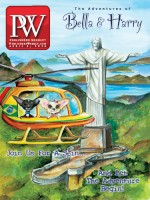Suzanna L. Panter is the educational specialist for library services in Henrico County Public Schools, just outside Richmond, Va. She oversees 83 librarians and 70 assistants, who serve more than 50,000 K–12 students in her system’s 70 schools. Panter designs library programs, handles staff development, negotiates with vendors, and does whatever it takes “to help our librarians be effective,” she says. Prior to taking her supervisory position, Panter was an elementary teacher and school librarian. Among her other professional achievements, Panter was an ALA Emerging Leader in 2009 and was chosen to attend the first ALA Leading to the Future Institute, in 2013. She also is a current Lilead Fellow and chair of the Virginia Association of School Librarians’ supervisors committee.
We asked Panter to tell us more about her district’s innovative work, some trends she’s seeing in the field, and what she’ll be addressing as a presenter during the Director’s Symposium Breakfast on April 21 at the Texas Library Association annual conference.
The model used in your school system earned distinction as a National School Library Program of the Year in 2011 (given by the American Association of School Librarians). What are some of the innovative things happening in your school libraries?
We pride ourselves on having an amazing focus on collaboration and co-teaching. Our students and librarians don’t have a set library time, and there is flexible scheduling for librarians to work with teachers to co-teach and co-assess in classrooms or in the library, whatever works best. We do a lot of research and inquiry with the students, as well as technology integration—all our schools are one-to-one with laptops in grades 6–12 and we incorporate the AASL’s Standards for the 21st-Century Learner. We work hard at building relationships so that teachers and administrators can trust the school librarian as an equal partner in teaching. We also have an open-access policy—kids can come to the library all day long, anytime they want. The younger students [K–2] have more structure than the older ones. But there’s a nice mix to it, and it gives them a good foundation. Some of the younger kids come in three to four times a week. We’ve had this in place since 1996, and it’s considered a best practice, but I realize it’s often difficult for other districts to implement.
Can you talk about a few exciting trends or movements you see in the school library world right now, and why they are important and/or exciting?
I’m very excited about the makerspace movement. Most of them started in school libraries. It gives kids a different experience that they don’t have in their day-to-day. Nonprofits have been getting more involved, but makerspaces should always be wide-open to kids. Educators and librarians should guide students without squashing their creativity.
I also love the Genius Hour movement. It comes from the corporate world, where companies like Google suggest that their employees spend 20% of their work time just tinkering and exploring their own ideas. In the school setting, we try to create time for kids to do self-directed research. They decide, “I want to learn about this,” and follow their passion wherever it leads them. It works hand-in-hand with makerspaces. Librarians play an important role in all of this when they make the library a place where kids’ minds can wander and they are not prescribed what to read.
You’ll be speaking at TLA. Can you preview what you’ll be addressing there?
I get to talk about how we make our libraries and librarians indispensable. There’s been a resurgence of positions opening—the pendulum is finally swinging in the other direction, and we have a shortage of school librarians in Virginia, D.C., and other places. The first thing is that you need to sell the principal on what should happen. You need a very well-trained school, because school librarians need to be teachers first. We leave the “librarian-ing” to our assistants. Taking the operational stuff off the librarian’s plate helps them keep the focus on teaching.
It’s important not to kowtow to administrative pressure. You are diluting your impact and core mission if you are doing all the other tasks in the school. We have to stand up for ourselves to be indispensable as part of the curriculum, but not indispensable for doing tasks that we are not supposed to be doing. We often say yes because we need everyone to like us and we need to have good relationships with everyone in the school. You need to know when to say no, but also how to say why you need to say no. The main message is that school librarians are indispensable to promoting the whole child and should be given the autonomy to do what they do best: to help students discover their passions and keep that light of learning in their hearts.



 Volume 263
Issue 14
04/04/2016
Volume 263
Issue 14
04/04/2016





